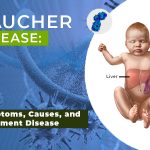Key Takeaways:
- More than 275,000 new cases of multiple myeloma (MM) are expected to occur globally by 2040.
Multiple myeloma (MM) is a blood cancer characterized by the proliferation of malignant plasma cells that typically arise in the bone marrow. - B-cell maturation antigen (BCMA) is a vital cell surface antigen found in almost all cases of multiple myeloma (MM).
- BCMA can be used as a target for immunotherapy, a type of medicine that helps stimulate the immune system to detect and attack myeloma cells.
- Several BCMA-targeted immunotherapy medicines including Teclistamab-cqyv (Tecvayli) have been approved for relapsed/refractory multiple myeloma (RRMM) after other types of treatment have been tried.
Overview of BCMA:
In multiple myeloma (MM), plasma cells develop genetic changes that lead them to become cancerous. B-cell maturation antigen (BCMA) is a protein found on almost all multiple myeloma (MM) cells and isn’t generally found on any normal cells aside from plasma cells. Because BCMA is on myeloma cells but not regular cells, it’s a promising target for treating multiple myeloma (MM).
Anti-BCMA treatments are a sort of immunotherapy, which is a therapeutic approach that uses one`s immune system to combat disease. Anti-BCMA is a targeted treatment that mainly destroys cancer cells, leaving major healthy cells intact. Due to this, anti-BCMA therapy is a very different approach from other myeloma treatments like chemotherapy, radiation therapy, bone marrow transplants, and surgery.
Characteristics of Those Eligible for BCMA-Targeted Therapies:
BCMA-targeted therapies are authorized for adults with relapsed/refractory multiple myeloma. Relapsed myeloma occurs when the treatment of myeloma works initially, but then the cancer returns. Refractory multiple myeloma (MM) happens when the blood cancer does not respond to any existing treatment at all.
Healthcare providers will only recommend anti-BCMA therapies if you’ve had at least 4 treatment regimens, with at least 3 types of medicines. These might include:
- An immunomodulatory medicine, such as pomalidomide, lenalidomide, or thalidomide
- A proteasome inhibitor (PI), such as ixazomib, carfilzomib, or bortezomib
- An anti-CD38 medicine, such as daratumumab or isatuximab-ifrc
Currently Authorized/Approved BCMA Therapies:
BCMA immunotherapies are a novel anti-MM therapeutic approach for myeloma. As of now, there are 4 anti-BCMA therapies including Teclistamab-cqyv (Tecvayli), approved by the Food and Drug Administration (FDA) for treating adult patients with multiple myeloma (MM). The other three are Idecabtagene vicleucel (Abecma), Ciltacabtagene autoleucel (Carvykti), and Elranatamab-bcmm (Elrexfio).
Although these are all anti-BCMA therapies for MM, they each target BCMA in a bit different way. The medicines Teclistamab-cqyv and elranatamab-bcmm are bispecific T-cell engagers or BiTEs. Idecabtagene vicleucel and ciltacabtagene autoleucel are chimeric antigen receptor T-cell (CAR T-cell) therapies.
Teclistamab-cqvy:
Teclistamab-cqyv, sold under the brand name Tecvayli is a bispecific T-cell engagers (BiTEs). It fights myeloma by binding in two ways. First, the bispecific antibody binds to B-cell maturation antigen (BCMA) on the cell of myeloma. The anti-BCMA antibody also binds to a nearby T cell. After the antibody binds to both of these cells, the T cell%E2%80%99s cytotoxic (cell-killing) potential is activated. The T cell releases material that destroys the myeloma cell.
In October 2022, teclistamab-cqvy became the first FDA-approved BCMA bispecific antibody for multiple myeloma. The approval took place on behalf of the overall response rate in clinical trials. The overall response rate for this bispecific antibody was 62%. It%E2%80%99s administered subcutaneously (under the skin).
Learn More About Anti-BCMA Immunotherapy:
If someone or their loved one with myeloma already tried 4 treatments for multiple myeloma (MM) that have failed, or if someone`s myeloma has relapsed after 4 or more lines of therapy, they may qualify for BCMA-targeted immunotherapy. If individuals would like to learn more about anti-BCMA treatments, they should ask their myeloma specialist.






